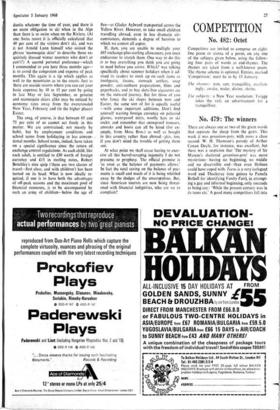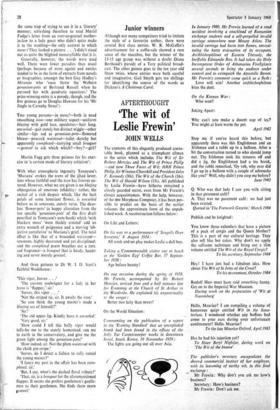No. 479: The winners
There are always one or two of the given words that separate the sheep from the goats. This week it was geranium-pots, with teens a close second. W. H. Thomson's parody of Arthur Conan Doyle, for instance, was excellent, but there was a suspicion that 'The mystery of Sir Marcus's shattered geranium-pots' was more mysterious—having no beginning, no middle and no discernible end—than even Holmes could have coped with. Teens is a very inelegant word and Thackeray (one guinea to Pamela Bethell for identifying Vanity Fair), in attempt- ing a gay and informal beginning, only succeeds in being coy: 'While the present century was in its teens etc.' A good many competitors fell into
the same trap of trying to use it in a 'literary' manner; refreshing therefore to read Muriel Fudge's letter from an ever-so-genteel mother- in-law to a lady guest who didn't quite make it to the wedding—the only context in which teens (They looked a picture . . .') didn't stand out as quite the blighted monosyllable that it is.
Generally, however, the words were used well. There were fewer parodies than usual (perhaps because of teens again) and entries tended to be in the form of extracts from novels br biographies, amongst the best Guy Hadley's Miranda who 'once threw the Wilburn geranium-pots at Bertrand Russell when he pursued her with quadratic equations' The prize-winning entry is a parody, though, and the five guineas go to Douglas Hawson for his `Mr Jingle in Carnaby Street': Two young persons—in teens?—both in need smoothing iron—one military aspect—uniform blazing with gold lace, epaulettes—hair long, uncurled—gait stately but distinct wiggle—other similar—lips red as geranium-pots—flowered blouse—peacock waistcoat—toilet sketchy but apparently completed—carrying small bouquet —genteel, to ask which which?—boy?—girl?
Martin Fagg gets three guineas for his exer- cise in 'a certain mode of literary criticism':
With what atmospheric ingenuity Tennyson's 'Mariana' evokes the teens of the jilted lover, into whose faithful soul the iron has forever en- tered. However, what we are given is no blazing objurgation of amorous infidelity: rather, the recital of a rich despair which, like the lush petals of some luxuriant flower, is uncurled before us in sonorous, stately verse. The deso- late 'flower-pots' (a happy alteration from the too specific 'geranium-pots' of the first draft pencilled in Tennyson's note-book) which 'with blackest moss' were thickly crusted' add an extra wrench of poignance and a moving 'ob- jective correlative' to Mariana's grief. The total effect is like that of a brocaded waistcoat— sensuous, highly decorated and yet disciplined; and the completed poem breathes out a rare, sad fragrance—a bouquet that is heady, haunt- ing and never merely genteel.
And three guineas to Dr W. I. D. Scott's faithful Wodehouse: `This viper, Jeeves . .
The current soubriquet for a lady in her teens is "flapper," sir.'
`Jeeves, this viper . .
`Not the striped tie, sir. It awaits the iron.' `So you think the young master's made a blazing ass of himself?'
`Sir !'
`The old upper lip. Kindly have it uncurled.' `Very good, sir.'
`How could I tell this bally viper would tally-ho me to the stately homestead, run me to earth in the conservatory, and give me the green light among the geranium-pots?'
`How indeed, sir. Not the plum waistcoat with the chalk pin-stripe.'
`Jeeves, do I detect a failure to rally round the young master?'
`I fancy my part in the affair has been com- pleted, sir.'
`But, I say, what's the dashed floral tribute?'
`That, sir, is a bouquet for the aforementioned flapper. It seems she prefers gentlemen's gentle- men to their gentlemen. She finds them more genteel.'



































 Previous page
Previous page